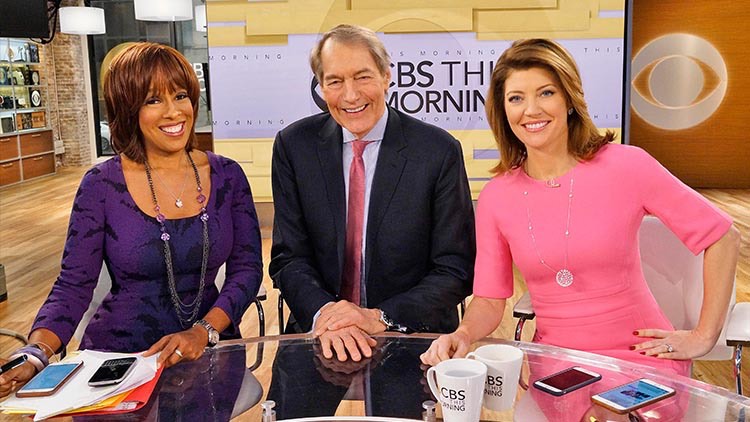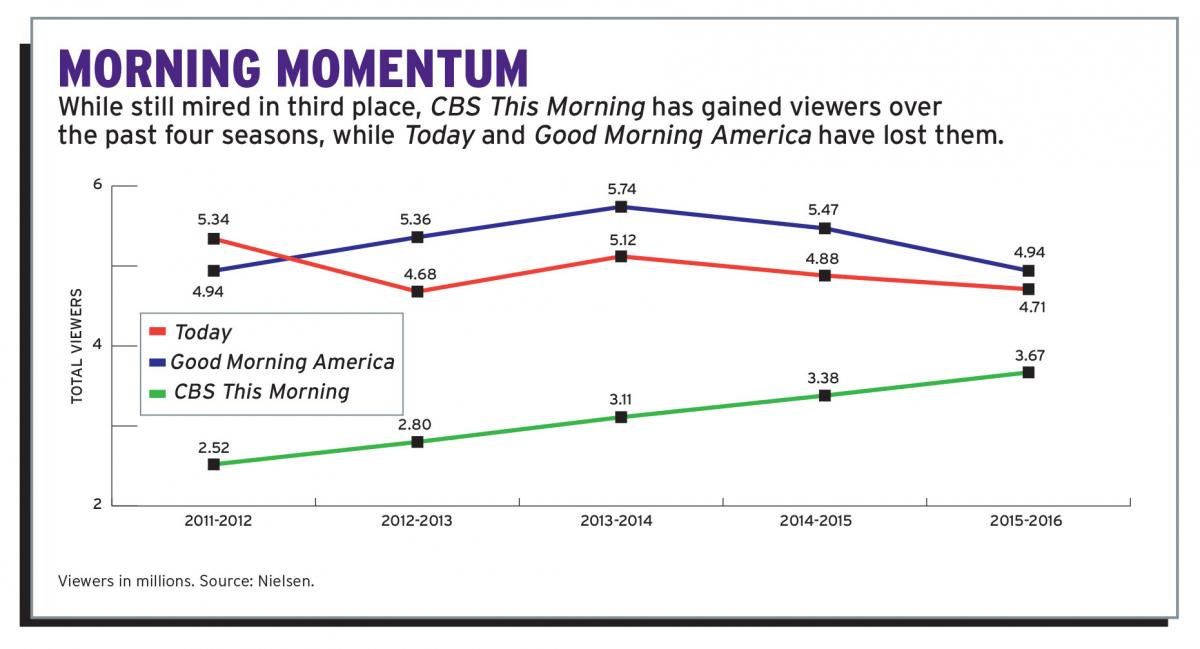'CBS This Morning' Eyes Bigger Prize

The smarter way to stay on top of broadcasting and cable industry. Sign up below
You are now subscribed
Your newsletter sign-up was successful
There is a date, somewhere off in the distance, when CBS News execs figure their morning show will, at long last, climb into the No. 2 position in the daypart. What would have been unthinkable a few years ago is increasingly something they envision at the CBS Broadcast Center colossus on Manhattan’s way West Side.
Extrapolating the ratings growth of CBS This Morning five years after it launched, Ryan Kadro, the show’s executive producer, has a rough idea of when that game of ratings leapfrog may take place. He’s asked his research wiz for some help in pinpointing the date, but the numbers guy would rather not play fortune-teller.
“There’s a date out there, but despite my pressing, he won’t share it,” says Kadro, who moved up to the morning EP spot when Chris Licht shifted to The Late Show. “We think about it all the time.”
To be sure, third place is, in this case, also last place. Yet the energy and optimism around 530 W. 57th St. is palpable. In early 2012, CBS News rolled the dice on hard news, betting that a morning program stripped of cooking shows, plaza concerts and other staples of a.m. television would work as effective counterprogramming. As we enter 2017 with talk of fake news dominating the media discussion, CBS This Morning’s focus on More Real News— a hashtag it has employed for nearly the whole of the show’s tenure—is finally paying off.
David Rhodes, CBS News president, smiles at the coincidence. “We’ve been promoting real news at a time when the industry’s obsession is fake news,” he says. “How much more can we do with that? A lot. A lot of people are looking for more real news.”
Cronkite Meets Captain Kangaroo
The morning show has long been a bugaboo for CBS News. Walter Cronkite sat in the Morning Show chair for six months in 1954, succeeded by Jack Paar and Dick Van Dyke before Cronkite returned a year later, Van Dyke at his side. That last iteration was cut to an hour to make room for Captain Kangaroo at 8 a.m.
The smarter way to stay on top of broadcasting and cable industry. Sign up below
The slot has held a wide range of programs designed to compete with ABC’s Good Morning America and NBC’s Today, including Good Morning!, The CBS Morning News, The Morning Program (featuring comedy bits from Bob Saget) and, simply, Morning.
The Early Show had a run from 1999 to early 2012, but never truly emerged as competition. At that point, CBS News pivoted its philosophy—if it couldn’t compete with the glossy bookings and snappy repartee of the competition, its thinking was, at least it could produce a show that the likes of CBS News legends Cronkite and Don Hewitt would’ve been proud of.
CBS This Morning, with Charlie Rose, Gayle King and Erica Hill, debuted in January 2012. In July of that year, Norah O’Donnell, then the network’s chief White House correspondent, took over for Hill.
Rose likes to say he, King and O’Donnell are winning over one viewer at a time. Get a person to watch once or twice, he says, and there’s a good chance they’ll switch from GMA or Today. “We believe the ratings follow quality and good work,” Rose says. “It may not be overnight.”
It definitely hasn’t been overnight, but the growth is indisputable. In the fourth quarter, CBS This Morning averaged 3.69 million total viewers, a gain of 6%, and 1.1 million more than when the show launched. During the same period, NBC dropped 1% to 4.58 million and ABC slid 6% to 4.66 million.
Kadro recalls a congratulatory note from Evening News anchor Scott Pelley in 2012, when the newscast hit an early milestone. “You’re living in the 2s,” it read.
In the 25-54 demo in the fourth quarter, CBS went up 10% to 1.1 million while NBC was a flat 1.79 million and ABC fell 8% to 1.53 million.
Morning Mix
Morning TV remains lucrative. Pew Research pegged annual revenue for the three shows at $809 million in 2015, the most recent year it has numbers for.
It wasn’t long ago that the CBS affiliates, pleased as they were with the net’s primetime performance, were so put off by the sinkhole that the morning show had become that they fought to put local news in the slot. Affiliates board chairman Chris Cornelius, VP of business development at Morgan Murphy Media, says it’s a different story now. He challenged coworkers partial to GMA and Today to switch to CBS for a month, and— as Rose predicted—about half ended up sticking with CBS This Morning. “Once people sample the show, it’s really hard to turn away,” he says. “Affiliates in general are pretty happy with the direction of the show, and we hope it continues to grow.”

At a time when the news cycle can’t seem to catch its breath, whether it’s Donald Trump or gun violence or Putin’s posturing or ISIS, Cornelius believes that positions CBS This Morning particularly well among a.m. players.
CBS’ morning recipe is fairly simple. The program employs a deep reserve of correspondents, leans heavily on the chemistry of its three anchors, goes long on substantive interviews and mostly skips the fluffy bits that dominate the competition’s shows, particularly after 8 a.m. Rhodes scoffs at a rival’s report on ugly Christmas sweaters just before the holidays. “I mean, really—that’s the best people can do at 8:30?” he says.
Kadro notes how he often gives extra time to segments, unsexy as they may be, related to politics, policy or overseas turmoil. He’s willing to withstand a ratings dip of a few tenths of a point with such stories, but says he increasingly sees an uptick. “The audience is responding to what we’re doing,” Kadro says. “If we think it’s interesting, we’re going to do it.”
Chemistry Lesson
Chemistry is tough to measure, and even tougher to come up with; finding the right blend of morning talent has doomed many exec producers and network news chiefs. Much was made of the pairing of Rose and King at launch—“the two do not make an immediately logical pair,” Huffington Post, speaking for many, said in 2011—but each anchor plays a unique, and even vital, role in the team. Rose is the veteran broadcaster, O’Donnell the young but steely White House scrum alum, and King, with a background in radio, local TV and magazines, is something of an “ombudsman,” in Rhodes’ words. “She asks the question on everyone’s minds, but maybe they’re hesitant to blurt it out,” he says.
Atypical of morning TV, all three sit around the table to interview a guest, at times giving the program the feel of a lively dinner party. “Each of us might find something distinctly interesting about a book or a movie,” says O’Donnell, “and that leads to a richer conversation.”
It’s the same vibe when the three sit for an interview in the green room, the smell of coffee and baked goods filling the glass cube. Framed photos of Vice Presidentelect Mike Pence, Oprah Winfrey and sponsor Toyota cover the walls. The anchors interrupt and tease each other with impunity as they push home their points. “When you feel somebody is on your side, when you work with people who make you better and have your back, the chemistry just falls into place,” says King.
Leslie Moonves, CBS Corp. chairman/president/ CEO, says the trio’s rapport has been “absolutely essential” to the show’s turnaround. “Add to that the tremendous executives and producers working behind the scenes and you have a show that is not only working financially, but also something that we are all very proud of at CBS,” he says.
Happy News Year
Just before his troops broke for the holidays, Rhodes offered the news division resolutions for the new year. Among them: Talk more and email less—on the phone, in person, to sources and colleagues. Be original in your reporting and never forget the Real News core value. As the memo put it, “Everyone has rallied behind the Real News mission. But who could have anticipated that we’d be promoting Real News at a time when our industry is so focused on Fake News? If there was ever a time to carry the Real News message forward—now is that time.”
Anchor teams don’t stay together forever, and that second place coronation that Rhodes, Kadro and company have been dreaming about may, in fact, never come. Morning news ratings are a zero sum game, and GMA and Today continue to fight hard for every booking and ratings point. “The other guys are very good,” concedes King.
After 35 years in the news business, Rose has seen the (few) ups and (many) downs of CBS News’ morning affairs. He’s been around long enough to recognize a good story when he sees one. “When we first started, nobody said anything about us—they didn’t even reference us when talking about morning television,” he says. “Now they do.”
Michael Malone is content director at B+C and Multichannel News. He joined B+C in 2005 and has covered network programming, including entertainment, news and sports on broadcast, cable and streaming; and local broadcast television, including writing the "Local News Close-Up" market profiles. He also hosted the podcasts "Busted Pilot" and "Series Business." His journalism has also appeared in The New York Times, The L.A. Times, The Boston Globe and New York magazine.

